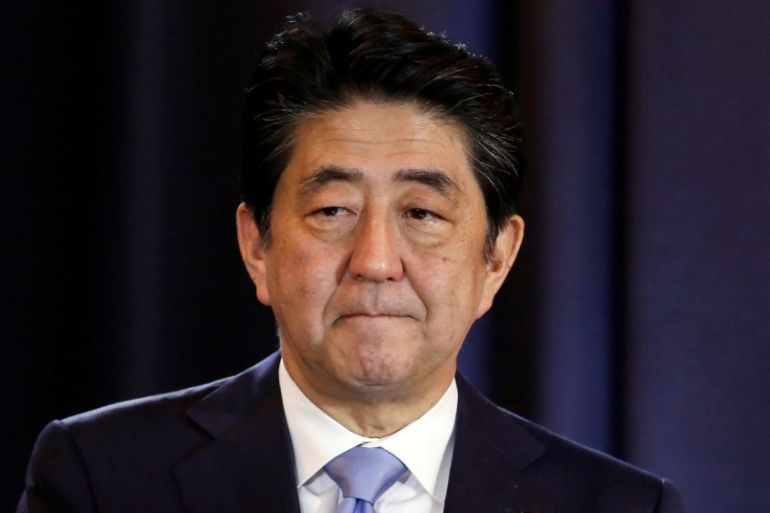Japan’s Shinzo Abe to visit Pearl Harbor with Obama
The prime minister will become Japan’s first leader to visit the site of his country’s attack on the US.

Prime Minister Shinzo Abe will visit Pearl Harbor with US President Barack Obama, becoming the first Japanese leader to travel to the site of the Japanese attack that drew the United States into World War II.
Abe’s visit was announced on Monday, only two days before the 75th anniversary of the deadly December 7, 1941 assault on the US naval base in Hawaii.
Keep reading
list of 4 itemsEcuador weighs security, international arbitration in latest referendum
‘Triple spending’: Zimbabweans bear cost of changing to new ZiG currency
Boeing hit with 32 whistleblower claims, as dead worker’s case reviewed
His journey to Pearl Harbor will be part of a December 26-27 visit to Obama’s home state, where they will hold talks and visit the war site together.
WATCH – Hiroshima: Was the atomic bomb necessary?
“It’s a visit to commemorate the victims,” Abe said. “We should not repeat the horror of war.”
The White House confirmed the upcoming meeting in Hawaii, saying “the two leaders’ visit will showcase the power of reconciliation that has turned former adversaries into the closest of allies, united by common interests and shared values”.
More than 2,300 US servicemen died in the aerial attack, which will be marked on Wednesday by a remembrance ceremony and a moment of silence at 7:55 am local time, when the Japanese planes hit their first target.
Abe said that he wanted his meeting with Obama to highlight the countries’ close current relationship.
“I’d like to make it an opportunity to send a message to the world that we will further strengthen and maintain our alliance towards the future,” he said, a signal to the incoming US President Donald Trump administration.
The US maintains numerous military bases in Japan, along with about 47,000 troops, under a security treaty that obligates it to protect the country, crucial for Tokyo given its restraints on waging war.
![More than 2,300 US servicemen died following Japan's aerial attack of Pearl Harbor in 1941 [Reuters]](/wp-content/uploads/2016/12/beca4c6a98674ae084d466b74bcf0e5e_18.jpeg)
But Japan was shocked at Trump’s statements on the campaign trail – that the Asian nation should pay more to support US troops and might even consider developing its own nuclear weapons.
Though he later walked back on the comments, they jolted public opinion in the world’s only country to ever be attacked by atomic bombs.
No apology
In August 1945, the US dropped two nuclear bombs on Japan, ending the war.
Obama went to Hiroshima in May, becoming the first sitting US president to visit one of the nuclear attack sites. He laid a floral wreath at the memorial, spoke of the suffering of the victims and reiterated his call for the abolition of nuclear weapons, but did not offer apology for the attack.
It is unlikely that Abe will apologise for Pearl Harbor either.
Abe, a staunch nationalist who has called for Japan to revise the war-renouncing constitution imposed on it by US occupiers after the war, has made statements appearing to question whether his country was an aggressor.
And while standing by apologies made by his predecessors for the war in Asia, he said last year that Japan’s future generations need not say sorry.
|
|